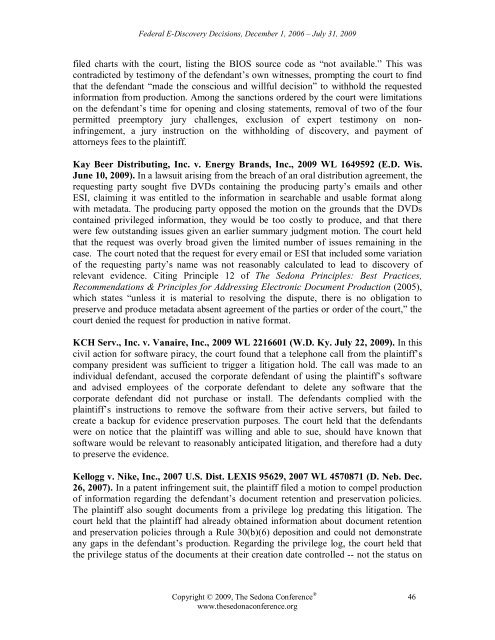Federal Court Decisions Involving Electronic Discovery, December 1 ...
Federal Court Decisions Involving Electronic Discovery, December 1 ...
Federal Court Decisions Involving Electronic Discovery, December 1 ...
You also want an ePaper? Increase the reach of your titles
YUMPU automatically turns print PDFs into web optimized ePapers that Google loves.
<strong>Federal</strong> E-<strong>Discovery</strong> <strong>Decisions</strong>, <strong>December</strong> 1, 2006 – July 31, 2009<br />
filed charts with the court, listing the BIOS source code as “not available.” This was<br />
contradicted by testimony of the defendant’s own witnesses, prompting the court to find<br />
that the defendant “made the conscious and willful decision” to withhold the requested<br />
information from production. Among the sanctions ordered by the court were limitations<br />
on the defendant’s time for opening and closing statements, removal of two of the four<br />
permitted preemptory jury challenges, exclusion of expert testimony on noninfringement,<br />
a jury instruction on the withholding of discovery, and payment of<br />
attorneys fees to the plaintiff.<br />
Kay Beer Distributing, Inc. v. Energy Brands, Inc., 2009 WL 1649592 (E.D. Wis.<br />
June 10, 2009). In a lawsuit arising from the breach of an oral distribution agreement, the<br />
requesting party sought five DVDs containing the producing party’s emails and other<br />
ESI, claiming it was entitled to the information in searchable and usable format along<br />
with metadata. The producing party opposed the motion on the grounds that the DVDs<br />
contained privileged information, they would be too costly to produce, and that there<br />
were few outstanding issues given an earlier summary judgment motion. The court held<br />
that the request was overly broad given the limited number of issues remaining in the<br />
case. The court noted that the request for every email or ESI that included some variation<br />
of the requesting party’s name was not reasonably calculated to lead to discovery of<br />
relevant evidence. Citing Principle 12 of The Sedona Principles: Best Practices,<br />
Recommendations & Principles for Addressing <strong>Electronic</strong> Document Production (2005),<br />
which states “unless it is material to resolving the dispute, there is no obligation to<br />
preserve and produce metadata absent agreement of the parties or order of the court,” the<br />
court denied the request for production in native format.<br />
KCH Serv., Inc. v. Vanaire, Inc., 2009 WL 2216601 (W.D. Ky. July 22, 2009). In this<br />
civil action for software piracy, the court found that a telephone call from the plaintiff’s<br />
company president was sufficient to trigger a litigation hold. The call was made to an<br />
individual defendant, accused the corporate defendant of using the plaintiff’s software<br />
and advised employees of the corporate defendant to delete any software that the<br />
corporate defendant did not purchase or install. The defendants complied with the<br />
plaintiff’s instructions to remove the software from their active servers, but failed to<br />
create a backup for evidence preservation purposes. The court held that the defendants<br />
were on notice that the plaintiff was willing and able to sue, should have known that<br />
software would be relevant to reasonably anticipated litigation, and therefore had a duty<br />
to preserve the evidence.<br />
Kellogg v. Nike, Inc., 2007 U.S. Dist. LEXIS 95629, 2007 WL 4570871 (D. Neb. Dec.<br />
26, 2007). In a patent infringement suit, the plaintiff filed a motion to compel production<br />
of information regarding the defendant’s document retention and preservation policies.<br />
The plaintiff also sought documents from a privilege log predating this litigation. The<br />
court held that the plaintiff had already obtained information about document retention<br />
and preservation policies through a Rule 30(b)(6) deposition and could not demonstrate<br />
any gaps in the defendant’s production. Regarding the privilege log, the court held that<br />
the privilege status of the documents at their creation date controlled -- not the status on<br />
Copyright © 2009, The Sedona Conference ® 46<br />
www.thesedonaconference.org
















